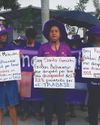
“ Empleo si, pero con dignidad!”
The chant comes from a group of about 40 women in Choloma, Honduras, who have assembled outside the offices of Delta Apparel, a multinational garment company. Calling for “jobs, but with dignity,” they are demanding that the company reinstate three workers who were fired. The workers say the firings are illegal and discriminatory because they suffered from workplace injuries.
The sun is hot and a man stands beside the rally selling bags of water. The women pass a megaphone around and take turns leading chants.
The rally was coordinated by the Colectiva de Mujeres Hondureñas (CODEMUH), a grassroots women’s rights group that organizes women working in the maquiladora sector to defend themselves against workers’ rights violations, which are systemic across the industry.
Cheap labour and free trade zones form the backbone of the maquila business model. Maquilas are factories in Latin America where commodities are produced for export while being exempted from various taxes, duties, and tariffs. In Honduras, neoliberal policies – in particular, corporate, municipal, income, and fuel tax exemptions – have contributed to the underfunding of health and education systems, which the government is now working to privatize.
Mass protests are unrolling against a backdrop of rising costs for housing, electricity, and food that make it very difficult for many Hondurans to get by. Families making minimum wage can only afford 41 percent of the basic family food basket, according to studies by the Asociación de Consumidores de Honduras. The food basket – a list of 30 tax-exempted basic goods – is one of two measures in Honduras for calculating the cost of living.
Bu hikaye Briarpatch dergisinin November/December 2019 sayısından alınmıştır.
Start your 7-day Magzter GOLD free trial to access thousands of curated premium stories, and 9,000+ magazines and newspapers.
Already a subscriber ? Giriş Yap
Bu hikaye Briarpatch dergisinin November/December 2019 sayısından alınmıştır.
Start your 7-day Magzter GOLD free trial to access thousands of curated premium stories, and 9,000+ magazines and newspapers.
Already a subscriber? Giriş Yap

PLATFORMS FOR PEOPLE, NOT PROFIT
Digital platforms boast that they’ve “democratized” cultural production. But what would truly democratic platforms look like in Canada?

ORGANIZING THROUGH LOSS IN THE HEART OF OIL COUNTRY
The story of climate justice organizing in Alberta, at the heart of the tarsands, is the story of a group of young activists learning what it means to lose, and keep on fighting

GROWING THE LABOUR MOVEMENT
How unions are using community gardens to engage members, nourish communities, and help strikers weather the picket line

A NEW ERA FOR OLD CROW
In the Yukon’s northernmost community, the Vuntut Gwitchin First Nation is reckoning with how to preserve their land and culture, amid a warming climate and an influx of tourists

“At Least Hookers Get Wages”
The risky business of sex work in the gig economy

The Literal – And Literary – Futures We Build
Briarpatch editor Saima Desai talks to two judges of our Writing in the Margins contest about Idle No More and MMIWG, ethical kinship, writing queer sex, and their forthcoming work.

The Cost Of A T-Shirt
In Honduras, women maquila workers are fighting back against the multinational garment companies that they say are endangering their health and safety.

Milking Prison Labour
Canada’s prison farms are being reopened. But when prisoners will be paid pennies a day, and the fruits of their labour will likely be exported for profit, there’s little to celebrate.

Bringing Back The Beat
In mainstream media, labour journalism has been replaced by financial reporting and business sections. But journalism students are raising the labour beat from the grave.

There's No Journalism On A Dead Planet
Corporate media owners are killing local newspapers – which is making it impossible for everyday people to understand the on-the-ground impacts of the climate crisis